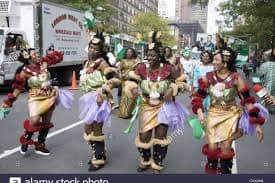
Regards the palm-belt in the South-East Nigeria, Ibibio is the most ancient of all the ethnic groups in Nigeria and in the new Biafran Nation State.
According to Robert Mckeon, the Ibibio are probably the indigenous natives from whom most small tribes of Qua Ibom and Calabar are descended. The early settlement of Ibibio in the area led to the development of a number of sub-clans, notably the Anang, the Efik, the Oron and the Ekid. Talbot said, “That at about 7000BC, permanent settlement of some of the ethnic groups in Ibibio land had already begun, and note that the Ibibo language is probably the most ancient of all the semi Bantu languages.
The Ibibo tribe is the fourth largest ethnic sets in Nigeria, and barely outnumbered by the Igbo, our neighbor. However, Nigeria was and has been ever since, classified by the Royal Niger Company in 1914 as having only three major ethnic groups namely: the Hausa, the Yoruba and the Igbo. Available evidence indicates that the original homeland of Ibibio is at Usak Edei in Cameroon. According to Ford and Jones, the Ibibio settlement in Usak Edei then forms small tribes in the Kumba division of Cameroon. Upon leaving the Cameroon territory, part of Ibibio arrived at their present location following some major directions.
Probably, about 8000BC some group reached Nigeria by overland routes and settled at Ibom. From Ibom, some of the Ibibos spread to Abak, Uyo and Ikot Ekpene and other areas of what is known as the mainland of Cross River State.
Other Ibibios came to the mainland by sea. These include the Uruan, Oron, Eket and Ibeno. The split of the sub-group (now called Efiks) from their kin-fold, the (Uruan) seem to have started by about the 16th Century. The Ekid people came to the mainland by sea. In 7000BC, three Hebrews, Shobab, No’-gah and Abi-i-tal arrived the coast of Atlantic Ocean at Esuk Ubuong known and called Ine Akpautong presently. This is one of the deepest and widest seaports in Ibibio ethnic group. Talbot, who for many years conducted anthropological research among the Ibibios, suggested that the Efiks started to claim a separate identity by about 1600AD. He wrote, soon afterwards, a section of Ibibios expelled either by the oncoming of Igbos or inconsequence of a defeat at the hands of a town of their own tribe (Uruan) migrated to old Efik town near Ikoneto.
SOCIAL SYSTEM:
Ibibo society consists of villages, each of which belongs to larger units known as the “Clan” the Clan was often named after the founder of the first village in the area. Each Ibibio village is independent and equal in status. The villages consist of individual families which comprising the husband, his wife/wives, children and grand parents. The society is mostly polygamous with formerly large families. In Ibibio land, age is venerated. The respect is extended to the elders that come from several cherished convictions. The oldest male of the family is often chosen as the head of the village, unless he is incapacitated for any reason. In the Traditional setting, those family meetings, village councils or Traditional Rulers Councils lay down laws and regulations for the governance of all units. For the enforcement of these laws, each Ibibio village has its own Ekpo and Ekpe society before the arrival of Christianity which inspires the believers’ heart through the Holy Spirit with love, joy, hope, peace and mercy; and they are expected to rejoice because of the abundant help He had provided for His church.
OCCUPATION AND SPORTS:
The Ibibio largely engaged in farming, fishing and trading. While farming is the principal occupation of the Ibibio upland, the river side Ibibio traditionally work as fishermen at fishing port commonly known as INE. Trading is done by middle men who act as brokers between the producers of good and the consumer. Outside the farming and fishing season, the Ibibio traditionally spend their time with various recreational activities, with games and sports like wrestling, swimming, oyo, ekara and nyori.
LANGUAGE:
As observed by G. I. Jones and Darryl Ford the word Ibibio is both an ethnic and linguistic terms. All the Ibibio speak and understand the same language; IBIBIO. The dialectal differences among the various Ibibio groups can be attributed largely to the long period territorial isolation between groups. This variation in the Ibibio language reflects adaptations to divers’ contacts and social differences of various Ibibio groups. With reduced interaction, the speakers of Ibibio tend to form variants of their language. Thus the major dialect of the Ibibio language includes the Uruan, (now popularly referred to as EFIK), the Anang, the Oron, the Ekid and the Ibeno dialects.
This is the history of the happy people of IBIBIO TRIBE!






